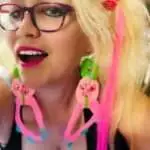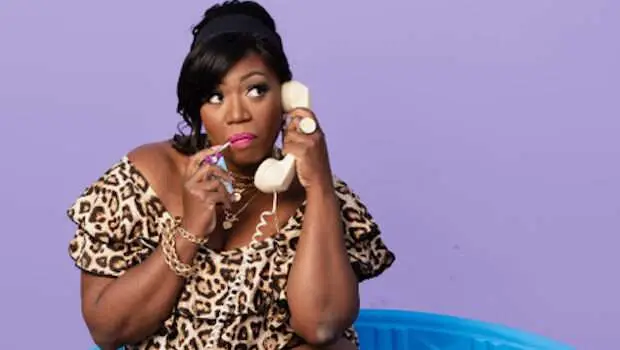Want to listen to the article? Great--listen here!
Adiba Nelson’s hilarious, heartbreaking, and bold debut memoir Ain’t that a Mother: Postpartum, Palsy, and Everything in Between (Blackstone, 2022) explores the cavernous lows of postpartum depression, the joys and challenges of raising a daughter with high medical needs, the naughtiness of burlesque dancing, and all the messiness in between. Afro-Latina Adiba grew up in New York City but moved to Tucson, Arizona, with an only 4% Black population. This is a book about race, place, Adiba’s own strong Puerto Rican mother, and the curses that run through the lineage of women in her family. I loved Adiba’s BFF style of storytelling, and I felt like we were gabbing in a Cheesecake Factory on a Friday night as I munched on an Impossible Burger, slowly dipping my fries in ranch, mesmerized by her “What the… Did that really happen? Nah, that couldn’t have happened…” stories.
I first met Adiba in 2017 at a Tucson TEDx event. Both of us were auditioning for the few available spots. I arrived with bloodshot eyes after a blowup-blowout breakup the night before with my long-term boyfriend. During the drive in my Orange Prius, I wondered how I’d get through the day. Then, as soon as I stepped into the ginormous room, I met an even more ginormous, larger-than-life, Adiba. We hit it off immediately. I hadn’t practiced, but Adiba’s talk was on point—every word meticulously rehearsed. I was dressed in my uniform, black leggings and a cotton top, but Adiba wore a fire hydrant red dress, snazzy earrings, and spiky heels, which seemed to be her usual uniform, too. I never secured a spot in the show, but not unsurprisingly, Adiba was selected.
I remember Adiba’s energy then: self-confident, funny, and driven, and whatever she had, I said, “Order me up some of that!” So when I heard about her book release, I scooped it up. Tucson has a small-town feel, especially within the artsy literary community. At Adiba’s book launch, one-hundred-fifty Tucsonans came out of their Covid caves to support her on a magical night. We sat under stars, ingesting the smell of the cool desert air, nibbling on crunchy bruschetta.
Adiba and I have quite a bit in common. We’re both only children. Both of our mothers were single and lived in the Bronx. Both of our families moved from the East Coast to Arizona because of asthma—Tucson’s dry climate was known to help asthma sufferers back in the day. We both also lived in Texas; go figure. We both danced burlesque too, though I never made it onto a stage—I only practiced my routines in private. And, a little treat we learned is that we went to the same high school! Today, our low-income school is surrounded by gates and guards and resembles a prison, so I couldn’t be more thrilled we both survived and also became writers.
I’m an empty-nesting Mama to two grown sons, 24 and 26, and I’m past the early stages of motherhood, but Adiba’s book was relatable because it’s about single mothering, which I am, dating, which I’ve done a lot of in the past, and addiction, which also runneth over in my family. But, mostly reading Adiba’s words made me feel not alone. And joyful.

TAMARA MC: Your self-confidence shines through. Can you tell me about self-confidence and what it looks like or hasn’t looked like in your life?
ADIBA NELSON: What it hasn’t been for me is having a severe eating disorder that I still struggle with to this day, and it takes on various shapes and forms, right? It has looked like me flirting with the idea of suicide a couple of times and never being able to do it. It has looked like me making poor relationship and sex decisions. But that all comes from a lack of knowledge of self, a lack of confidence in myself. Also, it looks like me getting so intimidated by something I don’t even try to do it. Or I wait until the very last minute when I’m freaking out.
Self-confidence is always a journey. The self-confidence I have now started in 2013 when I went to an event in Portland, Oregon, for Fashion Week, and I was assisting on a plus-size model runway show. I saw these women who looked like me. Size, color, shape. They were killing it on this catwalk; you couldn’t tell these girls anything.
I might be the only person who’s ever cried at a high fashion runway show, but I was looking at these women, and I’m like, they’re gorgeous, and they look like me, and they’re so confident. If I can look at them and see they’re beautiful, strong, and powerful, how come I can’t see that in myself? There were even women with gaps in their front teeth like me. I was like, where, where have you been all my life? Why haven’t I seen you, people, before?
Something clicked inside my head; that was the beginning of the process. I still struggle with so many different things, but I don’t let low self-confidence consume me, and I don’t let the struggle define me. I try to stay rooted and grounded in that confidence I stepped into.

TAMARA MC: Plan B didn’t work for you. Can you tell me more about your thoughts about Plan B and the overturning of Roe v. Wade?
ADIBA NELSON: Under no circumstances do I regret having my daughter. None whatsoever. I was supposed to have this child. I dreamt about her when I was 23 years old. I saw her dad and was like, oh, damn, well, here we go. I wasn’t far enough in the relationship to be like, I want to have your baby. Let’s do this. Sure, I want to have sex with you, but do I want your children? Not yet. No. So I wasn’t actively trying to make a baby, but God had other plans, whatever.
I’m overweight, and it should say very clearly on the Plan B box that if you are over XYZ pounds, Plan B might not be as effective. I’m very much pro-choice. But for me, my personal belief is pro-life because abortion is not my thing. So, when I realized that Plan B didn’t work, I was like, I guess I’m having a baby. And I’m too selfish for adoption. I’ll just put it plain and simple; I couldn’t bear the thought of someone else raising my kid.
But let’s speak about someone like my daughter, who is 13 and not sexually active. She’s disabled, and when her period comes around, she gets cluster seizures back-to-back that can only be stopped with rescue medication. The only way I’ve been able to get the seizures to stop is by putting her on birth control, which regulates her hormones.
But, in Arizona, where I live, there’s a push to cover contraceptive care. None of this makes sense; I don’t think anyone thoroughly thought about the repercussions.
If having a child is not healthy for you, whether physically, mentally, emotionally, or financially, you shouldn’t be forced into it. This is a pro-birth issue because if it were pro-life, then we wouldn’t have an adoption crisis. There shouldn’t be any kids sitting in foster care.
TAMARA MC: In your memoir, we learned a lot about your mother and the women in your life, but your dad was missing from the pages. We learn he was also missing from your life. What do you think happens to a girl when they don’t have a father who actively participates in their life?
ADIBA NELSON: I don’t have data or facts to back this up, but if we don’t have a father figure, an uncle, a cousin, a friend, whomever, as an active part of our life, we often tend to seek fatherly validation.
Your father is the first man who will tell you you’re smart, pretty, and capable. To this day, I don’t know why that holds so much more weight than when your mom tells you. And when you don’t have that in your life, we sometimes don’t seek it out in the best possible ways, right? We try to fill that hole with other things like substance abuse or sex abuse. I think I tried to fill that void with many different things, including food and sex.
Dad is typically more of the risk-taker, right? More the one who’s going to be like go out there, and try it. Moms are like, no, put on the helmet. But dad’s, like, you’re fine, brush it off. So there’s this level of confidence that dads instill in you. Because they’re like, do it.
But it’s the little things that dads do, too, like when they tell you they’re proud of you. So, when your male partner tells you they’re proud of you, and you didn’t grow up with a daddy in your life, it gives you that same endorphin rush. And sometimes you’re with a partner who means it, and sometimes you’re with a partner who’s just saying it to get into your pants.
TAMARA MC: At your book launch, a man in the audience asked, “How can men better support women?” I liked your answer, so I’m going to ask you the same question.
ADIBA NELSON: My answer was: just show up. You know, y’all talk about how much you love women. Show up; prove it. Like screw how much you love us. Don’t keep sending us out on the front line to fix the stuff that y’all broke. Like, you love us, then protect us. Act like it. Protect our rights. Protect our lives. Protect our children. Make sure that we live a life you can be proud of.
We weren’t allowed to vote. We weren’t founding fathers. It was fathers. Y’all did this. Y’all put everything in place. We had to fight even to get to vote. You love us so much; act like it. Put your butts on the line instead of making us put our butts on the line.
Your work doesn’t just stop in the boardroom. It’s ongoing, just like our work doesn’t stop when we get home. You say you love me. Prove you love me. Love is a verb.

TAMARA MC: What do you want us to know about your daughter Emory?
ADIBA NELSON: She’s so bright. Anyone who meets her sees it immediately. She is so filled with joy, love, and personality, but you have to be willing to see her. I think so many people think she’s a beautiful little girl. Yes, she’s stunning. But there’s so much more to my daughter than just how pretty she is. And there’s so much more to her than her communication device.
Emory communicates in so many different ways and tells you so many different things if you would just really see her, and I wish more people would do that. Don’t get me wrong. She’s very loved. Sometimes I feel like she belongs more to Tucson than me. She teaches me so much about how to be a better human every day. There’s not a judgmental bone in her body.
I hope that after I’m gone, somehow, this world picks up the mantle of protection and continues to protect her light because it’s enormous. It’s like a damn spotlight. A floodlight!

Tamara MC
Dr. Tamara MC is a child marriage and human trafficking survivor and a freedom activist for girls and women worldwide. She’s a mama to two amazing grown boys and a grandmama to two rambunctious pups, an Aussie named Willow and Boston Terrier named Blazer. She’s currently at work on her memoir Child Bride about her marriage at 12. Please reach out to her on her socials:
Link to original article
